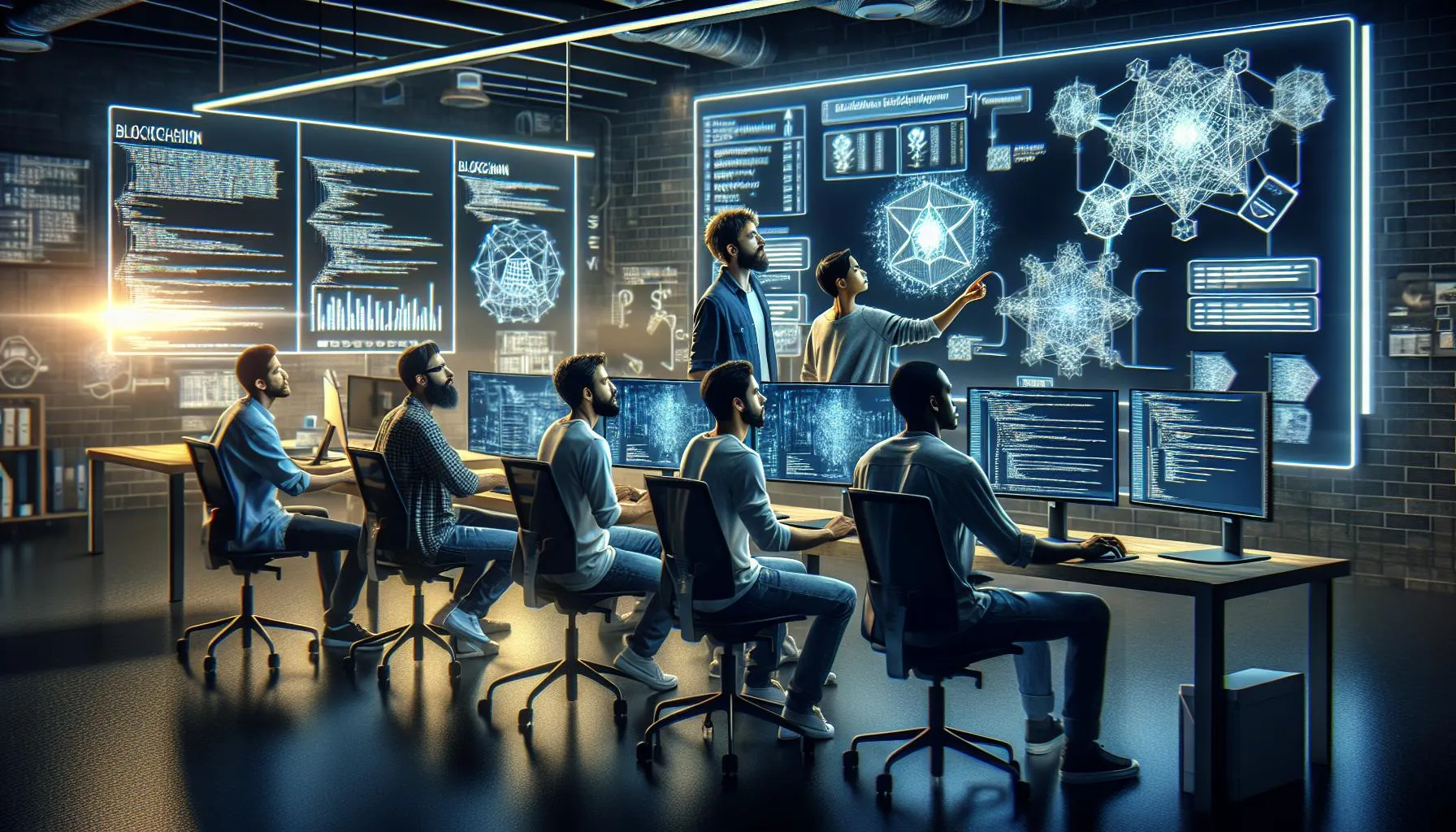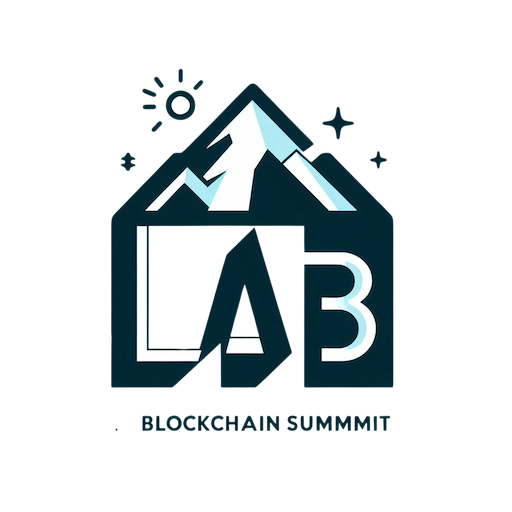
The blockchain market is expected to reach over $69 billion by 2032. This explosive growth highlights the increasing demand for skilled professionals in this field, particularly blockchain developers.
A blockchain developer specializes in creating and managing decentralized digital ledgers. These experts play a crucial role in various sectors, from finance to healthcare, ensuring secure and transparent transactions without relying on third-party verifiers like banks.
For businesses and tech enthusiasts alike, understanding the role of a blockchain developer can address significant concerns about data security, privacy, and efficiency. Many are looking to leverage this technology to streamline operations and enhance trust among stakeholders.
What Is A Blockchain Developer?
So, you’re curious about what a blockchain developer does? Imagine trying to explain the internet to someone in the early ’90s. That’s kind of where we’re at with blockchain. It’s all new and shiny but still a bit mysterious.
Okay, let’s break it down.
A blockchain developer is like the digital architect of this brave new world. They build and manage these decentralized ledgers (think super secure, transparent databases) that make cryptocurrencies like Bitcoin work. But it’s not just for crypto anymore; it’s getting into everything from healthcare to supply chains.
Ever tried explaining how the internet works to your grandma? “It’s on the cloud,” you say, hoping that’ll suffice. Well, a blockchain developer deals with something called consensus algorithms (fancy term alert: it’s just how everyone agrees on what’s legit data). They make sure no one’s messing with the records by using some very clever math.
What do they do day-to-day?
Well, picture them hunched over their laptops writing smart contracts. These are self-executing contracts where the terms are directly written into code—like setting up an automatic coffee maker but for transactions! They’re also tweaking protocols to ensure everything runs smoothly and securely.
Now here’s a quirky bit: because blockchains are decentralized, there isn’t one single place where data lives—it’s everywhere and nowhere at once! Remember those old spy movies where someone says, “If I tell you, I’d have to kill you”? Yeah, it’s kind of like that level of security but without the drama.
I remember when I first got into this space; it felt like learning another language—one full of cryptographic puzzles and logic gates instead of verbs and nouns. But once you get it, there’s this “Aha!” moment that’s pretty awesome.
The future? Oh boy! Blockchain developers could be working on anything from creating super-secure voting systems (bye-bye election fraud!) to ensuring your avocado gets from farm to table without any hiccups in between.
So next time someone mentions blockchain developers at a party—and trust me, it’ll happen more often—you can chime in confidently knowing they’re digital wizards making our tech-driven lives run smoother behind the scenes.
Key Skills Required for Blockchain Developers

So, you’re thinking about diving into the world of blockchain development? Awesome choice! Whether you want to build the next big crypto or create a decentralized app (dApp), there are some key skills you’ll need.
Programming Languages
First off, coding.
If you’ve ever tried to learn a programming language, you know it can feel like deciphering an alien language. But don’t worry, it’s not as bad as it sounds. For blockchain developers, languages like Solidity (used for Ethereum smart contracts), JavaScript, and Python are your bread and butter.
Why these? Well, Solidity is essential for writing those nifty self-executing contracts on Ethereum. JavaScript and Python help make everything work smoothly behind the scenes.
Think of Solidity as learning Klingon if you’re a Trekkie—cool but specific to one universe. JavaScript and Python are more like English; everyone uses them in tech because they’re versatile and powerful.
Understanding of Blockchain Platforms
Next up: platforms.
Imagine blockchain platforms as different social networks—you’ve got Facebook, Twitter, LinkedIn—all with unique features but serving similar purposes: connecting people. In blockchain terms, you’ve got platforms like Ethereum, Hyperledger Fabric, and Corda.
Ethereum’s where the action is if you’re looking at public blockchains with lots of dApps. Hyperledger Fabric is your go-to for private enterprise solutions—think corporate intranets versus public websites. Understanding these platforms helps you choose the right tools for your project.
Cryptography Knowledge
Now let’s talk cryptography—a fancy word that just means “how we keep things secret.”
Remember passing notes in class using code words so teachers wouldn’t catch on? Cryptography is kinda like that but way more complex and secure.
You’ll hear terms like “public key” and “private key,” which sound mysterious but aren’t too scary once you get used to them. Public keys are like email addresses; anyone can send stuff to you using it. Private keys are passwords; only you should know them to access what was sent securely.
Smart Contracts
Finally, smart contracts—the rockstars of blockchain tech! These digital agreements automatically execute when conditions are met without needing middlemen (like lawyers). Think of them as vending machines: You put in money (meet conditions), you get soda (contract executes).
I remember my first smart contract felt like magic—a script that could handle transactions all by itself! These little scripts can revolutionize industries from finance to supply chains by making processes faster and more transparent.
And there you have it! Master these skills—coding languages, platform knowledge, cryptography basics—and you’ll be well on your way to becoming a top-notch blockchain developer.
Roles And Responsibilities Of A Blockchain Developer
Ever wonder what a blockchain developer does all day? Imagine juggling flaming swords while riding a unicycle—it’s kind of like that, but with more coding. Let’s break it down.
Core Blockchain Developer
These folks are the wizards behind the curtain. They’re responsible for designing the architecture of blockchain systems. Think of them as city planners who decide where roads go and how buildings connect. They work on consensus protocols (fancy algorithms that make sure everyone in the network agrees) and create security patterns to keep things safe from cyber-baddies.
Core developers are also the ones tweaking existing blockchain tech to make it better, faster, or more secure. It’s like upgrading your phone’s OS but way more complicated. Ever heard of Corda or Quorum? These platforms need core devs to keep everything running smoothly so businesses can transact securely and privately.
Blockchain Software Developer
Now let’s talk about software developers in the blockchain world—they’re like chefs in a high-tech kitchen.
While core developers build the kitchen, software developers create delicious dishes (a.k.a applications). They write code for decentralized apps (dApps), smart contracts (self-executing agreements written in code), and other cool functionalities we use daily without realizing it.
If you’ve ever used an app that tracks your coffee beans from farm to cup or ensures your online vote is counted securely, thank a blockchain software developer. They’re also crucial for industries like finance, where they help carry out secure transactions without middlemen—saving time and money.
So next time you hear “blockchain developer,” think of someone who’s half digital architect, half wizard chef, making our tech-driven lives smoother one block at a time.
Tools And Technologies Used By Blockchain Developers
Alright, let’s jump into the cool stuff that blockchain developers use to make all this magic happen.
Development Frameworks
When I first started dabbling in blockchain, I felt like a kid in a candy store with all the development frameworks available. Let’s break down some of them:
- Ethereum: Think of Ethereum as the Swiss Army knife of blockchain platforms. It’s versatile and widely used for creating decentralized apps (dApps). The main language here is Solidity.
- Hyperledger Fabric: This one’s more like a secret club for businesses. It’s permissioned, meaning only approved members can join. It’s great for enterprise solutions because it allows private transactions.
- Corda: Imagine Corda as that super-efficient office manager who keeps everything running smoothly behind the scenes. Mainly used by financial institutions, Corda ensures transactions are private and secure.
These frameworks help developers build robust applications without reinventing the wheel every time they start a project.
Testing Tools
Testing tools! Ah, these are like those friends who point out spinach stuck in your teeth so you don’t embarrass yourself later.
- Ganache: This tool creates an Ethereum blockchain on your computer for testing purposes. It’s like having a sandbox where you can mess around without any real-world consequences.
- Truffle: No, not the fancy mushroom or chocolate; it’s a development environment and testing framework for Ethereum. Truffle makes deploying contracts easier than assembling IKEA furniture (and less frustrating).
- MythX: This one’s like hiring Sherlock Holmes to find vulnerabilities in your smart contracts before anyone else does. MythX scans your code for potential security issues.
Using these tools ensures that when your application goes live, it’s as polished as possible.
Version Control Systems
Version control systems are lifesavers—trust me on this one. They keep track of changes you make to your codebase so you can sleep at night knowing you have backups if things go south.
- GitHub: If GitHub were a person, it’d be that well-organized friend who has everything labeled and easily accessible. It’s popular because it hosts repositories online where multiple developers can collaborate seamlessly.
- GitLab: Similar to GitHub but with its own flair. GitLab offers integrated CI/CD pipelines which automate testing and deployment processes so you can focus on writing code instead of worrying about manual tasks.
These systems provide peace of mind and enhance teamwork by keeping everyone’s work synchronized.
Career Path And Opportunities
So, you’re thinking about diving into the world of blockchain development? Great choice! There are plenty of career paths and opportunities in this ever-growing field. Let’s break it down.
Entry-Level Positions
For those just starting, entry-level positions offer a solid foundation. Think of roles like Junior Blockchain Developer or Blockchain Intern. These jobs typically involve basic tasks such as writing simple smart contracts (self-executing agreements coded directly into the software) or assisting with maintaining decentralized applications (dApps).
When I first got started, I spent hours tweaking code to make sure everything worked smoothly. It was like solving complex puzzles but way more fun because every solution felt like a mini-victory dance. You’ll likely be working under the guidance of senior developers who’ll show you the ropes while keeping an eye on your progress.
The pay might not be astronomical at the beginning, but hey, everyone’s gotta start somewhere! Plus, these roles provide invaluable hands-on experience that sets you up for bigger things down the line.
Senior Roles
Now let’s talk about the big leagues: senior roles. If you’ve got a few years under your belt and have mastered skills like Solidity (a programming language for writing smart contracts), you can aim for titles like Senior Blockchain Developer or Blockchain Architect.
These positions often require you to design complex systems and lead projects from inception to deployment. Imagine being responsible for creating an entire blockchain network; it’s both daunting and exhilarating! When I reached this level, I finally understood what Spider-Man’s Uncle Ben meant by “with great power comes great responsibility.”
Salaries here get pretty enticing—think six figures—because you’re no longer just executing someone else’s vision; you’re crafting your solutions to real-world problems. It’s challenging but incredibly rewarding work.
Freelancing And Consulting
Not keen on sticking to one company? Consider freelancing or consulting in blockchain development. This route gives you flexibility and variety—you could be working on different projects every few months!
I once took on a freelance gig where my task was to create a secure voting system using blockchain tech. It was wild knowing that my code could potentially impact democratic processes!
As a freelancer, you’ll need strong networking skills to land gigs consistently—but if you’re good at what you do, word spreads fast.
Consultants are also in high demand since many companies want expert advice before diving into blockchain projects themselves. You get paid well for sharing your wisdom without having to commit long-term—a win-win!
What do you think? Ready to jump into this exciting world?
